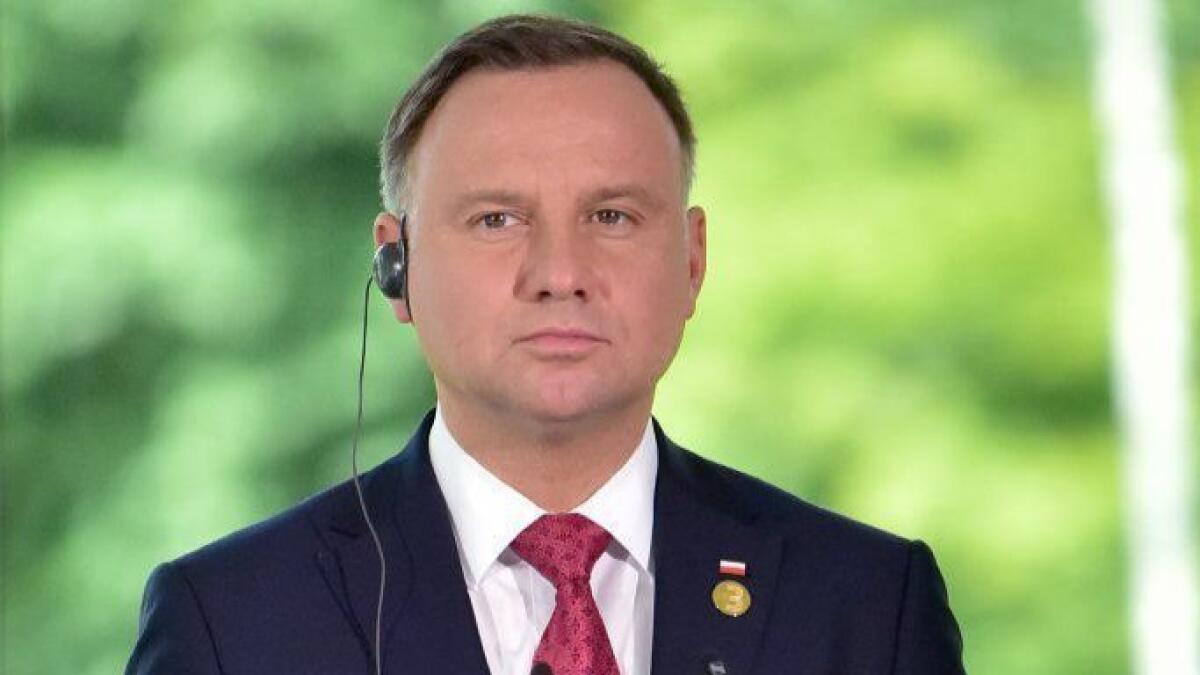Poland’s visiting president faces little pressure from Trump over democratic backsliding

- Share via
Reporting from WASHINGTON — Even before Polish President Andrzej Duda walks into the White House on Wednesday, he’ll have notched a political win.
Poland’s nationalist government in recent years has had an increasingly acrimonious relationship with the European Union, defying the bloc it joined 15 years ago with a string of measures including a crackdown on the independent judiciary and the free press.
So from Warsaw’s point of view, a warm relationship with Washington — in particular, the optics of a one-on-one meeting between Presidents Trump and Duda — counterbalances the distinct chill emanating from Western European capitals such as Paris and Berlin.
And with Polish parliamentary elections four months away, a show of friendship with an American president is a campaign selling point for the ruling party.
Poland is part of a cohort of Eastern European countries that shook off communist rule three decades ago, but now embrace a brand of staunch nationalism that meshes well with Trump’s ideological leanings.
In a 2017 visit to Warsaw, Trump portrayed Poland as a bulwark of Western civilization, lacing a high-profile address with blood-and-soil rhetoric and a menacing depiction of immigrants and Muslims — a message that resonates with right-wing movements in Europe as well as the United States.
Despite his title, Duda isn’t Poland’s most important political figure. The real power is considered to rest with Jaroslaw Kaczynski, who heads the ruling Law and Justice party, or PiS. But the White House visit boosts Duda’s prestige.
The White House says rule-of-law issues are part of an ongoing U.S.-Polish dialogue, but if a visit last month by Hungary’s authoritarian prime minister, Viktor Orban, is any guide, the Polish leader is unlikely to encounter much pushback from Trump over a recent spate of anti-democratic moves.
When Orban came to call, Trump used a joint news conference to praise him as a respected leader, brushing aside expressions of alarm from human rights groups and other Western governments.
In Trump and Orban’s side-by-side White House appearance, there was no mention of the Hungarian leader’s sustained attacks on his country’s democratic institutions, his conspiracist-style railing against Hungarian American philanthropist George Soros, or the Hungarian government’s punitive campaign aimed at nongovernmental groups with missions such as helping migrants.
“Probably like me a little bit controversial, but that’s OK,” Trump said of Orban.
Duda is expected to escape the high-profile gibes Trump has directed at some members of the North Atlantic Treaty Organization, particularly Germany, over military spending as a share of the country’s gross domestic product. Addressing a pet peeve of Trump’s, Poland has met a 2% target for such expenditures.
Poland has taken a canny approach to wooing an American president known to take considerable pride in his personal brand. Last year, Duda proposed naming a Polish military installation “Ft. Trump.”
That particular piece of Trump-themed real estate may not become a reality, but Poland is hoping to secure a larger American military footprint than the approximately 4,000 troops already in the country on a rotating basis. Duda told the Reuters news agency last week that “we are speaking about a strengthening of a U.S. presence.”
A senior Trump administration official, speaking to reporters on condition of anonymity on Tuesday, said there would be a “significant” security announcement in connection with Duda’s visit.
Poland’s mistrustful stance toward Russia puts it at odds with some of the Law and Justice party’s nationalist-populist allies elsewhere in Europe, including Orban and Italy’s interior minister, Matteo Salvini.
But even with differing views on the threat posed by Moscow, the European populists share plenty of common ground on matters such as curbing immigration and restricting the regulatory powers of the EU.
Under diplomatic protocol, it was once frowned upon for U.S. leaders to put a thumb on the scales of allies’ internal affairs. But Trump has tossed that convention aside in the current leadership contest in Britain amid the bitter fight over Brexit, and in the run-up to Israel’s April election, among other votes.
In advance of Poland’s October balloting, the Law and Justice party — emboldened by its decisive win in the European Parliament elections — is seeking to capitalize on the perception of a close personal relationship between Duda and Trump, said Melissa Hooper, director of foreign policy advocacy with Human Rights First.
“He wants that photo op,” she said of the Polish president.
Underscoring that, Duda has also invited Trump to Poland for the Sept. 1 commemoration of the 80th anniversary of the Nazi invasion of Poland, which marked the outbreak of World War II. The White House has not yet confirmed that visit, which would come weeks before the Polish vote.
Like Trump, Duda and the ruling party, with which he has largely allied himself, hope to avoid an economic downturn that could harm electoral prospects.
Polish officials have said Duda’s White House visit would be followed by stops in California, Nevada and Texas, aimed at attracting investment and forging energy and technology partnerships.
More to Read
Sign up for Essential California
The most important California stories and recommendations in your inbox every morning.
You may occasionally receive promotional content from the Los Angeles Times.










